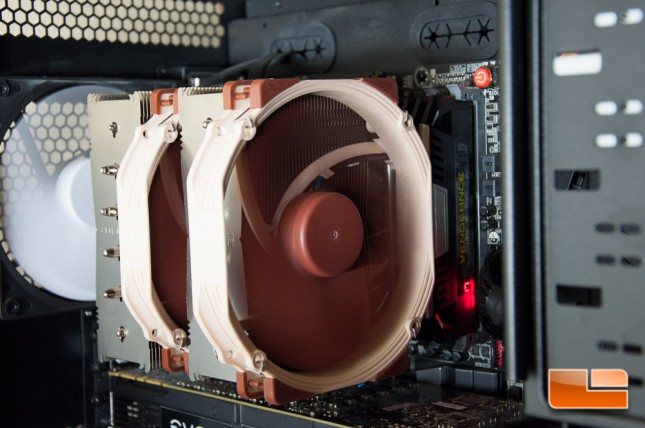Noctua NH-D15 Air CPU Cooler Review
The Test System
Before we take a look at the performance numbers, lets take a brief look at the test system that was used. All testing was done using a fresh install of Windows 7 Professional 64-bit and benchmarks were completed on the desktop with no other software programs running.
- Intel Core i7 4770k Quad-Core Haswell CPU
- Noctua NH-D15 CPU Cooler
- 32GB Corsair Vengeance Pro 1866MHz Memory
- GIGABYTE Z87X-UD4H Motherboard
- EVGA GTX 570 Classified Video Card
- 2x 120GB Samsung 840 Pro SATA III 6Gb/s SSDs in RAID 0
- Seasonic SS-760XP2 80 Plus Platinum Power Supply
- Windows 7 Professional Operating System
- Fractal Design Define XL R2 Chassis
Intel Z87/LGA1150 Platform
The Intel Z87 platform that we used to test these memory modules was running the GIGABYTE Z87X-UD4H motherboard with BIOS version F7 that came out on 08/05/2013. It is understood that there is a newer version of the BIOS, however in order to not taint the results, we will be sticking with a single version of the BIOS between all coolers. The processor used, the Intel Core i7 4770k, will be using the stock frequency of 3.5GHz with turbo boost enabled, which can boost it up to 3.9GHz. Low power state is enabled, which clocks the CPU at 800MHz at idle.
Many of the previous tests we chose not to overclock beyond the turbo frequency in order to show you what your average user would see, but we did find the limits of this particular processor without going too extreme on the voltage and will start to include those results. The 4770k will be overclocked to a 4.3GHz turbo boost at 1.270 volts, which is over the stock 1.193v. To push this particular 4770k stably to 4.4GHz required well over 1.4 volts, which the performance gains of a 100MHz increase was not worth that huge bump in voltage.

